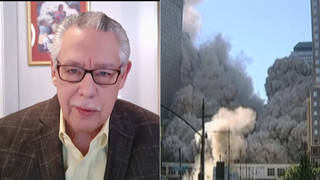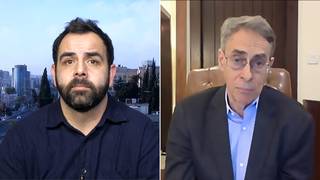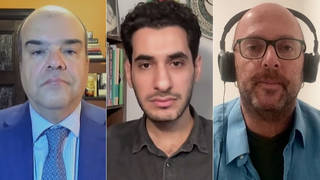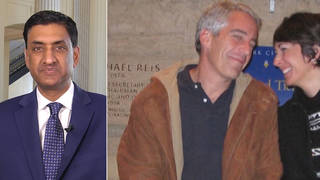
Israel launched airstrikes that destroyed part of the Syrian Defense Ministry and a facility near the presidential palace in Damascus on Wednesday, killing three people. This comes weeks after Israel launched unprovoked strikes on Iran, which led to a brief war that killed over 900 Iranians and 29 people in Israel. Adam Shatz, U.S. editor at the London Review of Books, says Israel’s motivation in the Middle East is to “settle accounts with any force in the region that might challenge its domination.” He also notes violent language around foreign policy has become “banal” in many Western countries. “It’s not simply Trump and the far right who speak blithely about overthrowing foreign governments, about bombing other foreign populations. It’s people who have a reputation … for being liberals and moderates,” says Shatz.
Transcript
AMY GOODMAN: This is Democracy Now!, democracynow.org, The War and Peace Report. I’m Amy Goodman, with Nermeen Shaikh.
NERMEEN SHAIKH: Syria’s interim President Ahmed al-Sharaa says Israel’s targeting of the country’s civilian and public institutions in order to undermine the region’s stability has been thwarted, for now, with the, quote, “intervention of American, Arab, and Turkish mediation, which saved the region from an unknown fate,” unquote. President Sharaa made the comment as Syrian forces have withdrawn from the southern city of Suwayda after reaching a ceasefire deal with armed groups in the Druze-majority region. The deal seeks to end days of sectarian violence exacerbated by Israeli attacks on Syrian forces in Suwayda, siding with Druze fighters. On Wednesday, Israeli strikes on Damascus killed three people and blew up part of the Syrian Defense Ministry and a facility near the presidential palace. President Sharaa responded in a televised speech today.
PRESIDENT AHMED AL-SHARAA: [translated] Israel, which has been targeting our stability and creating discord among us since the fall of the former regime, is now seeking to once again transform our pure land into an arena of endless chaos. It seeks to dismantle the unity of our people and weaken our ability to move forward in the process of reconstruction.
NERMEEN SHAIKH: Elsewhere in the region, President Trump said Wednesday that Iran wants to, quote, “negotiate badly,” but “We’re in no rush,” after Israel and the U.S. struck Iran’s nuclear facilities last month. Iranian leader Ayatollah Ali Khamenei said Wednesday the country is ready to respond to any new military attacks.
AMY GOODMAN: For more, we’re joined here in New York by Adam Shatz, U.S. editor of the London Review of Books. He has a new piece, “The World Since October 7th.” His latest book is The Rebel’s Clinic: The Revolutionary Lives of Frantz Fanon. He’s reported from Palestine, Lebanon, Algeria, Egypt and beyond.
Welcome to Democracy Now! It’s great to have you with us. You have a great beginning to this piece, a very provocative paragraph. On June 18th, “the sixth day of Israel’s attack on Iran, David Petraeus gave some unsolicited advice to Donald Trump in an interview with the New York Times. Trump, he said, should deliver an ultimatum to Ayatollah Ali Khamenei, ordering him to dismantle Iran’s uranium enrichment programme or face 'the complete destruction of your country and your regime and your people'. If Khamenei were to refuse, he added, 'that improves our legitimacy and then reluctantly we blow them to smithereens.'” You say, “That Petraeus was recommending Iran, a country of ninety million people, be reduced to Gaza-like conditions hardly occasioned comment: murderous threats [from] US officials against foreign leaders and their people no longer provoke shock, much less condemnation; they’re simply part of the 'conversation' about how the US should manage its empire.” Why don’t you take it from there?
ADAM SHATZ: Sure. Thank you so much for having me on. It’s a real pleasure to be here and an honor to follow the great historian Omer Bartov.
What I meant to underscore with that, with that paragraph, is that this kind of rhetoric has become utterly banal. And it’s not simply Trump and the far right who speak blithely about overthrowing foreign governments, about bombing other foreign populations. It’s people who have a reputation in the States for being liberals and moderates. David Petraeus was a darling of liberal intellectuals, you’ll recall, and he speaks very cavalierly about what is an offensive war, a war of aggression, an unprovoked war against another nation.
And I think that this does reflect a kind of shift in American political culture. Obviously, American foreign policy has been very violent — I mean, Vietnam, the wars against — the wars in support of the death squads in Latin America in the 1980s, the Iraq War of 2003. But this normalization of this kind of rhetoric does seem striking to me, and the fact that we can talk about a war of aggression against Iran because of its supposed nuclear weapons program without talking about the fact that there is a country in the Middle East which does possess a major nuclear facility, although we don’t talk about it, Dimona, which is the state of Israel. It’s simply not a part of the discussion.
NERMEEN SHAIKH: So, if you could say, Adam — you do talk in the piece about what you think was the ultimate rationale, both of the Israeli and then U.S. strikes on Iran, and what the impact of those strikes has been on the reform movement in Iran, because there was quite a vibrant — and is — opposition for many, many years, different movements that have come together in opposition to the regime.
ADAM SHATZ: Well, I mean, I think it’s — you know, it’s important to recall that 10 years ago, in 2015, there was the Iranian nuclear agreement, signed by Iran, by countries of the EU, by the United States, the joint comprehensive agreement. And three years later, Donald Trump decided to — decided to withdraw from it, even though, by all accounts, the agreement was working. So there was a diplomatic option for ensuring that Iran’s nuclear enrichment program would be directed to peaceful ends.
And, you know, in my view, the attack on Iran was a war of opportunity. After Israel decapitated the leadership of Hezbollah last fall, in a sense, a war with Iran was almost a foregone conclusion, because Hezbollah had provided a kind of shield, a bulwark, against a potential Israeli strike. And in fact, arguably, the attack on Iran was modeled on the war against Hezbollah in Lebanon in October of 2024, which led, of course, to the assassination of Hezbollah’s general-secretary, Hassan Nasrallah. I think that the primary motivation for attacking Iran has to do with Israel’s determination to settle accounts with any force in the region that might challenge its domination, that might provide support for Palestinian organizations resisting the occupation, and Iran had relationships with Hamas and with Islamic Jihad. I think that was a much more important factor than its uranium enrichment program.
NERMEEN SHAIKH: And what do you think, Adam? I mean, because, you know, the American strikes also, ostensibly — I mean, they did attack three nuclear enrichment sites in Iran, but according to a recent U.S. assessment, which was just reported today by NBC, these strikes — in these strikes, only one of the three nuclear enrichment strikes was mostly destroyed, setting work there back significantly, but the two others were not as badly damaged, which raises the question of whether there will be additional strikes, either by Israel or the U.S.
ADAM SHATZ: Well, the Israelis have threatened to carry out additional strikes. And it’s possible that they, in fact, prefer this arrangement, where the merest sign of an Iranian effort to enrich uranium beyond acceptable levels or to pursue a weapon will be met with further Israeli attacks. This situation may be preferable to the Israelis to any kind of diplomatic agreement.
And just to return to the question that you raised earlier about the Iranian reform movement, during Israel’s attack on Iran, Benjamin Netanyahu made a public appeal, a video appeal, to the Iranian people, claiming that Israel was a kind of liberating force and urging Iranians to overthrow the regime. There was even talk, of course, about assassinating the Supreme Leader Khamenei. In the initial hours, perhaps even days, of Israel’s attack, there were Iranians inside Iran who were pleased that certain members of Iran’s leadership, of the Revolutionary Guard were killed in targeted strikes, because there is tremendous discontent in Iran. The regime is widely hated. But when it became clear that Israel’s campaign was extremely violent, was indiscriminate, and that hundreds of people, and eventually probably about a thousand people, were to be killed in attacks on civilian neighborhoods, Iranians concluded that they had no wish to be liberated by Israel, by a state that, moreover, has been committing genocide in Gaza. And I think that perhaps the attack that most alarmed and disturbed Iranians was the attack on Evin Prison, I mean, the idea that Israel was attacking the very people who had suffered most under the Iranian regime.
NERMEEN SHAIKH: So, Adam, I want to go — I mean, let’s talk more about, you know, what precisely Israel has been doing in Gaza and the regional implications that you’ve just spoken of. But one of the things that you mention in the piece that is very interesting, which is the rise of organized crime in Gaza, encouraged by Israel. You quote Netanyahu as saying, quote, “We activated clans in Gaza that oppose Hamas. What’s wrong with that?” he said.
You write in your piece, quote, “As much as forced displacement, killing, starvation and humiliation, the promotion of criminality — of a lawless 'grey zone' of the kind evoked by Primo Levi, in which members of a persecuted group are enlisted to police, brutalise and, at times, kill their own — has become a defining feature of Israel’s rule inside Gaza.” The reference to the “grey zone” by Primo Levi is, of course, from his collection of essays, The Drowned and the Saved, which is, in fact, an account of his time in Auschwitz.
So, you know, this is not something that we hear about very often, what is happening by Palestinians to Palestinians under Israeli — I don’t know what you would call it — a coercion, much like as Primo Levi, you make the comparison, “grey zone” in Auschwitz. The Nazis made the Jews do to one another what the Nazis were doing also to the Jews.
ADAM SHATZ: Well, I mean, I think it’s important to see that the lawlessness in Gaza today is not — this is not a state of nature. This is something that is encouraged and promoted by the Israelis. As you just noted, Benjamin Netanyahu has publicly defended this policy of supporting this criminal clan, essentially a kind of mafia organization, a racket, which has been involved in cross-border smuggling and is said to have ties to the Islamic State. And this, of course, falls into a long pattern of Israel providing support to any group that might be undermining its immediate antagonist in the Palestinian national camp. And so, in this case, to weaken Hamas, they’re going to support this local thug. And, of course, the appearance of criminality and lawlessness ends up reinforcing the impression in the mainstream that Palestinians in Gaza are a lawless people. In fact, they’re suffering from a lawlessness which is an effect of specific policies, which is an effect, in a sense, of a tyranny imposed on them. And, you know, I don’t mean to suggest that the situation in Gaza is the same as the Auschwitz described by Primo Levi in his great book, but there are disturbing echoes.
AMY GOODMAN: So, I want to talk about the smear of antisemitism to those — against those who raise what’s going on in Gaza, for example. You quote Mark Mazower saying, “No one wanted to be called an antisemite” — this was after October 7th — “and yet if you believed the pundits, antisemites were everywhere, and it sounded like Manhattan was Berlin on the eve of Kristallnacht.” You say that previously, the fight against antisemitism was a left-liberal cause. How do you trace the trajectory from that moment to this one, when the leading — those leading the crusade against antisemitism are very much on the right, and the appeal of Israel to places like, well, the far right in France and Hungary and other places?
ADAM SHATZ: But not only are they on the right, Amy, but these are people who often themselves make highly antisemitic statements and who consort with notorious antisemites, like Nick Fuentes and Kanye West. And somehow, very shamelessly, they get away with it. It’s quite extraordinary.
I mean, I think this has — this has historical roots. This began, really, in the 1970s, when pro-Israel organizations and writers began to promote the idea of a new antisemitism, by which they meant criticism of Israel. And there was a campaign to equate any criticism of Israel’s policies, of the occupation, of Israel’s expansionist wars to hatred, to equate this with hatred of the Jewish people, and to smear criticism of Israel and anti-Zionism as inherently antisemitic. So this has deep historical roots, but clearly it’s been on steroids in the last decade or so.
And far-right organizations and leaders, I think, have found that by weaponizing the charge of antisemitism, it’s much easier to weaken the institutions that they already despise, those institutions being the university, democracy, immigration, for example. Antisemitism has become an incredibly potent tool to dismantle what remains of U.S. democracy. And we see far-right organizations in Europe which have drawn inspiration. Of course, there’s a lot of overlap between these groups. There is a kind of right-wing international.
But I think what we also have to emphasize is that there is a deep attraction on the part of far-right leaders and movements to Israel as a state, because Israel is an ethnonational state based on racial exclusion, based on policies of oppression, of dispossession, of apartheid. And for that reason, Israel has a strong appeal to these right-wing organizations — right? — and leaders, who love deportations, who love building walls. Israel is seen —
AMY GOODMAN: Ten seconds.
ADAM SHATZ: Israel is seen as a kind of model.
AMY GOODMAN: Well, Adam Shatz, we thank you so much for being with us, U.S. editor of the London Review of Books. We’ll link to your piece, your latest one, “The World Since October 7th.” And we’re going to have you back to talk about your book, The Rebel’s Clinic: The Revolutionary Lives of Frantz Fanon.
That does it for our show. I’m Amy Goodman, with Nermeen Shaikh. Thanks so much for joining us.













Media Options